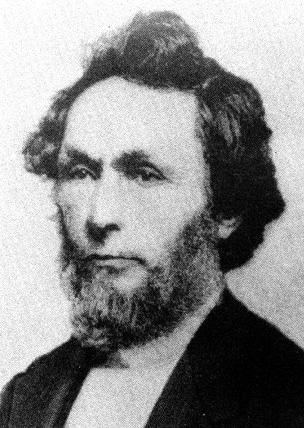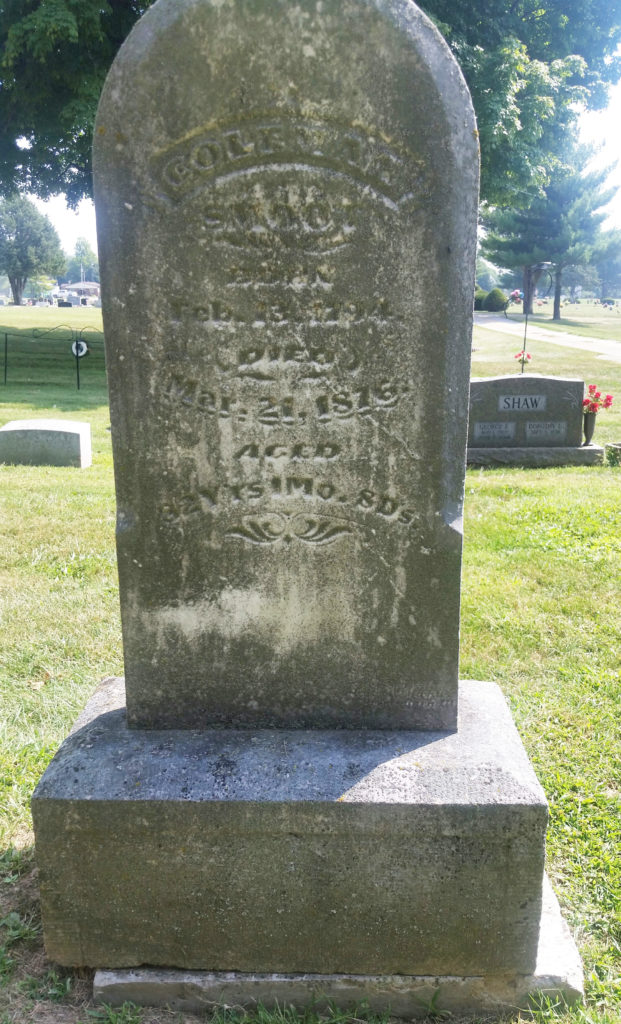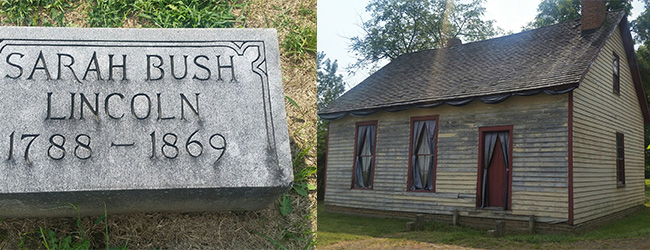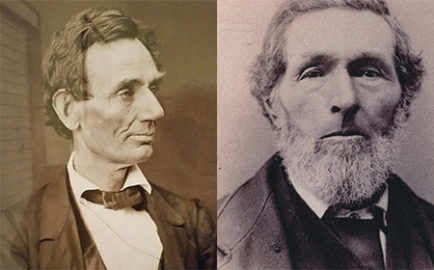
By Don Radebaugh – One of the best ways to get to know Abraham Lincoln is through his friends, family, neighbors and business associates. Thanks to his third law partner, William Herndon, there are hundreds of personal accounts available regarding our 16th President, reminiscences that were collected by Herndon over a 27-year span (1865 – ’92) following Lincoln’s death. Herndon, in collaboration with Jesse Weiks, interviewed hundreds of people who, not only knew Lincoln as President, but old friends that reached way back with Lincoln…back to his New Salem and Springfield, Illinois and Indiana days.
Herndon, the junior law partner in the firm of Lincoln and Herndon, put his own thoughts down on paper following the death of Lincoln in 1865. They were business partners from 1844 to 1861, right up to his departure for Washington on Feb. 11, 1861. It was during this time that Herndon was, arguably, closer to Lincoln than any other, and spent more time with Lincoln than anyone else.
Herndon recalled the conversation he had with Lincoln the last time Lincoln visited their Springfield law office on the afternoon of February 10, 1861. Lincoln would be leaving Springfield the following morning for the White House. The future President stopped by the law office to converse with “Billy” one more time before his big journey ahead.
When Herndon inquired about what to do about the Lincoln and Herndon sign over the office door, according to Herndon, Lincoln answered him…
“Let it hang there undisturbed. Give our clients to understand that the election of a president makes no change in the firm of Lincoln and Herndon. If I live I’m coming back sometime, and then we’ll go right on practicing law as if nothing had ever happened.”
Well now…that seems like a really magnanimous thing to say, but I’ve said that over and over every time I read something Lincoln said, or wrote. And what his friends and neighbors said about him only adds to the interesting “Lincoln Lore.”
According to Herndon, Lincoln “lingered for a moment as if to take a last look at the old quarters.”
Herndon followed him down the hallway, down the steps and out into the street.
Herndon continued…
“Our conversation was frequently broken in upon by the interruptions of passers-by who seemed desirous of claiming his attention. At length he broke away from them all. Grasping my hand warmly and with a fervent ‘good-bye,’ he disappeared down the street, and never came back to the office again.”
There are also scores of stories about his friends who came to the rescue when Lincoln was down and out. When he couldn’t pay his New Salem debt from a couple of failed stores, the courts, for retribution, confiscated his horse, saddle and all his surveying instruments, which at that time, were his only means of making a living. His good friend “Uncle Jimmy Short” went to the auction, bought all of Lincoln’s goods and promptly returned them.
“When the sale came off – which Mr. L did not attend – I bid in the property at $120.00, and immediately gave it up again to Mr. L,” Short wrote to Herndon. “This was in 1833 or 1834. Mr. L. afterwards repaid me when he moved to Springfield.
“Frequently when Mr. L. was at my house he would help me gather corn. He was the best hand at husking corn I ever saw. I used to consider myself very good, but he would gather two loads to my one.”

When Lincoln was first elected to the Illinois House of Representatives in 1834, he had no suitable clothing or money for the fare to Vandalia, which was where the State Capital was back then. No problem. Lincoln’s friend Coleman Smoot loaned Lincoln $200 dollars for a brand new suit with enough money to spare for travel to Vandalia.
In a letter Smoot wrote to Herndon.
“After he was elected to the legislature he came to my house one day. ‘Smoot did you vote for me?’ I told him I did. ‘Well,’ says he, ‘you must loan me money to buy suitable clothing for I want to make a decent appearance in the legislature.’ I then loaned him two hundred dollars which he returned to me according to promise.”
Mentor Graham was a New Salem schoolmaster and tutored Lincoln from time to time. Graham, whose grave I have visited many times, submitted several letters to Herndon.
“He was regular in his habits punctual in doing anything he promised. His method of doing anything was very systematic…he discharged all his obligations and duties to his God, his fellow men, himself and his country with more fidelity than is common to humanity. He was strictly honest, truthful and industrious and was one of the most companionable persons you will ever see in this world.”
Judge David Davis campaigned for Lincoln during his presidential run and often traveled with ‘Lincoln the lawyer’ on the Eighth Judicial Circuit. Davis had a different take on Lincoln according to letters he submitted to Herndon for publication. Note: Davis did not receive the appointment he desired under Lincoln’s presidency.
“Mr. Lincoln was not a social man by any means. His stories, jokes, which were done to whistle off sadness, are no evidences of sociality. His was a peculiar nature.
“Lincoln had no spontaneity, nor emotional nature, no strong emotional feelings for any person, mankind or thing. He never thanked me for anything. Never as I before said asked my advice about anything, never took my advice…took no man’s advice…listened patiently to all that had an idea.”
Robert Wilson, a New Salem neighbor, described Lincoln this way.
“He was a genial, fun-loving young man. Was always the center of the circle wherever he was. Everyone knew him and he knew everyone. His stories were fun, were fresh and sparkling, never with malevolence. He never told a story about an acquaintance with a view to hurt of hold up to ridicule, but purely for fun. The victim always enjoyed it as much as anyone else, esteeming it rather a compliment than a sarcasm, being, entirely destitute of malice.”

Lincoln’s mother Nancy Hanks Lincoln died in 1818 when Lincoln was just nine. It was his first real bout with depression or “melancholy,” as it was often described back then. Lincoln called it “the hypo,” which afflicted him all his life. Shortly after Nancy died, Lincoln’s father Thomas soon remarried to one Sarah Bush Johnston, who took to her stepson like no other. Herndon also traveled to her home in Coles County (Ill.) for an interview. Perhaps her thoughts are most telling.
“Abe never gave me a cross word or look and never refused in fact, or even in appearance to do anything I requested him. I never gave him a cross word in all my life. He was kind to everybody and every thing.
“His mind and mine – what little I had seemed to run together – moved in the same channel. Abe was a good boy. He didn’t like physical labor – was diligent for knowledge – wished to know and if pains and labor would get it he was sure to get it. He was the best boy I ever saw or ever expect to see. He read all the books he could lay his hands on. Abe could easily learn and long remember.
“He always had good health – never was sick – was tolerably neat and clean – cared nothing for clothes – fashion cut no figure with him. He never told me a lie in his life, never evaded, never equivocated, never dodged. He never drank whiskey or other strong drink – was temperate in all things. He never swore or used profane language. He loved animals and treated them kindly. Abe didn’t care much for crowds of people. He chose his own company which was always good.”
Lincoln visited his mother one final time in January of 1861.
“After he was elected President I still felt that something told me that something would befall Abe and that I should see him no more. Abe and his father are in heaven I have no doubt, and I want to go there – go where they are.”
@DonRadebaugh
Sources:
Herndon’s Informants, Edited by Douglas L. Wilson and Rodney O. Davis, copyright 1998
Herndon’s Life Of Lincoln, De Capo Press edition, new copyright 1983

